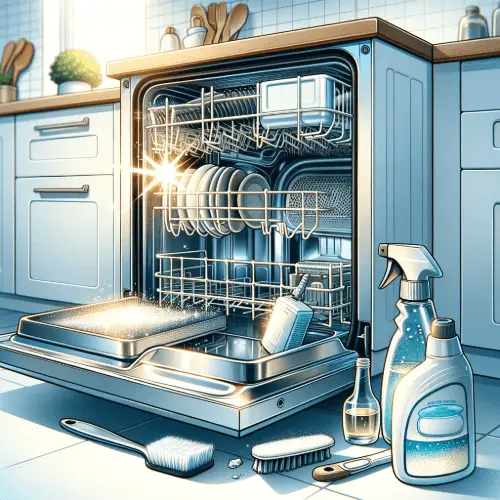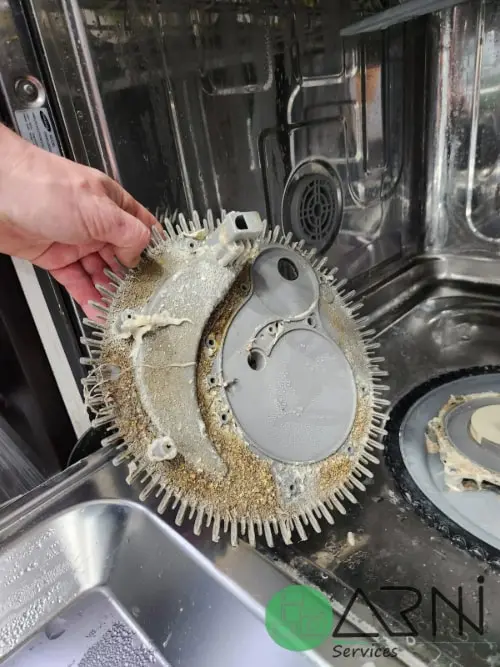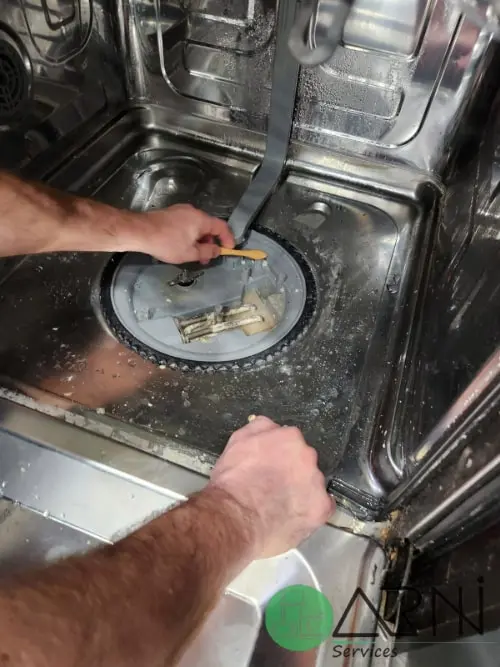Blog
Having a clean filter in your dishwasher is key. It helps your machine work well and last longer. Every time you use your dishwasher, the filter catches food bits and other stuff. If not cleaned, this can cause problems.
Cleaning your dishwasher filter regularly stops these issues. It makes sure your dishes come out clean and your dishwasher runs smoothly. Think of it like a health check for your machine. A clean filter means a happy, efficient dishwasher.
By keeping your filter clean, you’re not just getting cleaner dishes. You’re also saving money. How? A clean filter helps your dishwasher use less water and energy. Plus, it reduces the risk of costly repairs.

Knowing when to clean your dishwasher filter is essential for maintaining its performance. Here are the signs to look out for:
Dishes Not Properly Cleaned: One of the most obvious signs that your dishwasher filter needs cleaning is when your dishes aren’t coming out as clean as they used to. If you start noticing food residue, spots, or film on your glasses and plates, it’s likely that a clogged filter is affecting the cleaning power of your dishwasher.
Strange Noises During Cycles: Unusual noises emanating from your dishwasher could signal a dirty filter. When the filter is clogged, the dishwasher has to work harder to circulate water and clean your dishes. This extra strain can cause it to produce grinding or groaning sounds, indicating it’s time for a filter check and clean.
Unpleasant Odors Inside the Dishwasher: A dishwasher that smells bad is a clear indicator that the filter may be full of trapped food particles and debris. Over time, these residues can start to decompose, leading to musty or rotten smells. Regular cleaning of the filter is necessary to prevent these odors and maintain a fresh, clean dishwasher.
Water Not Draining Properly: If you notice standing water in the bottom of your dishwasher after a cycle, this could be a sign that your filter is blocked. A clean filter is crucial for effective water drainage. When it’s clogged, water can’t pass through as easily, leading to potential water backup and poor cleaning results.
Visible Food Particles and Grease: Sometimes, the need for cleaning is visually apparent. If you can see food bits, grease, or other debris accumulating in or around the filter, it’s definitely time for a cleaning. Regular inspections of the filter can help you identify when it’s time for maintenance.
Each of these signs highlights the importance of regular filter cleaning in maintaining the efficiency and longevity of your dishwasher. Not only does a clean filter ensure better cleaning results, but it also prevents potential damage and extends the life of your appliance.

We come to you, view all service location areas
Cleaning your dishwasher filter is a straightforward task, but having the right tools and materials makes all the difference. Here’s what you’ll need for an effective clean:
Soft Brush: A soft-bristled brush is perfect for gently scrubbing the filter. It’s tough enough to remove grime but won’t damage the filter’s delicate parts. If you don’t have a soft brush, an old toothbrush can work as a good substitute.
Mild Detergent: You’ll need a mild detergent to help break down grease and food particles. Choose a gentle, non-abrasive detergent to ensure it cleans without harming your dishwasher’s components.
White Vinegar: White vinegar is excellent for dissolving mineral deposits and removing odors. It’s a natural cleaning agent that’s effective yet gentle on your dishwasher.
Warm Water: Warm water helps to soften and loosen grime and debris, making it easier to clean the filter.
Sponge or Cloth: A sponge or soft cloth is useful for wiping down and drying the filter after cleaning. Make sure it’s clean to avoid transferring any dirt back onto the filter.
Container for Soaking (Optional): If your filter is particularly dirty, you might need a container to soak it in a mixture of warm water and detergent or vinegar.
Towel or Mat: Have a towel or mat ready to place under the dishwasher filter during cleaning. This helps protect your kitchen surfaces from water or detergent spills.
Gloves (Optional): For those who prefer not to touch the grime and debris, a pair of gloves can provide a barrier and make the cleaning process more comfortable.
Gathering these items before you start ensures a smooth and efficient cleaning process. Each tool and material plays a crucial role in effectively removing dirt and ensuring your dishwasher filter is thoroughly cleaned.
Different dishwasher models may have the filter located in slightly different places, but the process of locating and removing it is generally similar. Here’s how to do it:
Turn Off and Empty the Dishwasher: Safety first! Make sure your dishwasher is off and cool. Remove any dishes and racks to clear your workspace.
Locate the Filter: Typically, the filter is located at the bottom of the dishwasher. It’s usually a cylindrical tube that sits under the rotating spray arms. If you’re unsure, consult your dishwasher’s manual. Each model might have slight variations in filter design and location.
Remove the Bottom Rack: Slide out the bottom rack to access the filter area easily.
Inspect the Filter Assembly: Before attempting to remove the filter, take a moment to inspect how it is assembled. This will make it easier to put back together after cleaning.
Twist and Lift the Filter: Most filters can be removed by twisting them gently and then lifting them out. Some models may have a locking mechanism that needs to be disengaged. Turn it counter-clockwise to unlock.
Handle with Care: When removing the filter, be gentle to avoid damaging it. Filters are designed to be easily removable but can be delicate.
Check for Additional Filters: Some dishwashers may have more than one filter, like a coarse filter and a fine filter. Ensure you locate and remove all parts that require cleaning.
Inspect for Damage: Once removed, inspect the filter for any damage. If it’s damaged, it might be time to replace it.
Remember, each dishwasher model is unique. If you’re having trouble finding or removing your filter, refer to the user manual for specific instructions. It’s important to be familiar with your specific model to avoid any damage during the filter removal process.

Cleaning your dishwasher filter is crucial for optimal performance. Here’s a detailed, easy-to-follow process to ensure your filter is thoroughly cleaned:
Pre-Rinse the Filter: Start by rinsing the filter under warm running water. This initial rinse will remove loose debris and make the scrubbing process easier.
Soaking the Filter: If your filter is very dirty or has mineral buildup, soak it in a mixture of warm water and mild detergent or white vinegar. This will help to loosen the grime. Let it soak for about 10-15 minutes.
Gentle Scrubbing: After soaking, use a soft brush or an old toothbrush to gently scrub the filter. Focus on areas with the most buildup. Be careful not to damage the filter mesh. For stubborn grime, applying a bit more pressure may be necessary, but always be gentle.
Rinse Thoroughly: Once you’ve scrubbed the filter, rinse it thoroughly under warm water. Make sure all soap and loosened debris are washed away.
Inspect for Mineral Deposits: If you notice mineral deposits (white or green buildup), soak the filter in a mixture of white vinegar and water. Vinegar is excellent for dissolving these deposits.
Final Rinse and Dry: After ensuring all grime and deposits are removed, give the filter one final rinse. Shake off any excess water and dry it with a clean towel or let it air dry.
Reinstall the Filter: Once the filter is completely dry, place it back into your dishwasher. Make sure it’s properly seated and locked in place, if applicable.
Test Run the Dishwasher: After reinstalling the filter, run a short cycle without dishes to ensure everything is working correctly.
Use Baking Soda: For tough grime, make a paste of baking soda and water. Apply it to the filter, let it sit for a few minutes, then scrub gently.
Longer Soaking Time: If the buildup is significant, allow the filter to soak longer, possibly up to 30 minutes.
Regular Maintenance: Regular cleaning can prevent stubborn grime and mineral buildup. Make it a habit to clean your filter every month or as recommended by your dishwasher’s manufacturer.
Regular maintenance not only improves performance but also extends the life of your appliance.

Once your dishwasher filter is clean and dry, it’s time to put it back in place. Reinstalling the filter correctly is crucial for the dishwasher to function properly. Here’s a step-by-step guide:
Align the Filter: Start by aligning the filter to its original position at the bottom of the dishwasher. Most filters are designed to fit in a specific way, so it should be clear how it needs to be positioned. If you’re unsure, refer back to your dishwasher’s manual for guidance.
Secure the Filter in Place: Depending on your dishwasher model, the filter may simply drop into place, or it might require twisting into a locked position. If your filter twists into place, gently turn it clockwise until you feel it lock. Be careful not to force it, as this could damage the filter or the dishwasher.
Check for Stability: Once the filter is in place, give it a gentle nudge to ensure it’s secure. A properly installed filter shouldn’t move around. If it feels loose or unstable, remove it and try again.
Reinstall Any Additional Components: If your dishwasher has a secondary filter or any other components that were removed, make sure to reinstall them as well. These components are often crucial for the effective operation of your dishwasher.
Replace the Bottom Rack: Slide the bottom rack back into the dishwasher, ensuring it’s properly aligned and moves smoothly.
Conduct a Test Run: After the filter and all components are back in place, it’s a good idea to run a short cycle without dishes. This helps to ensure that everything is working correctly and that the filter is properly installed.
Check for Leaks: During the test run, keep an eye out for any leaks or unusual noises. If everything seems normal, your dishwasher is ready to use.
Remember, correctly reinstalling your dishwasher filter is key to maintaining its cleaning efficiency and longevity. If you encounter any difficulties or are unsure about any step, consulting your dishwasher’s user manual can provide model-specific instructions and diagrams, ensuring a smooth and accurate reinstallation process.
Regular maintenance of your dishwasher not only ensures its efficient operation but also extends its lifespan. Here’s a guide to preventive maintenance, focusing on the dishwasher filter and general upkeep:
Regular Cleaning of the Filter:
General Dishwasher Maintenance Tips:
Monitor Dishwasher Performance:
Keep an eye out for any changes in the dishwasher’s performance, such as dishes not being cleaned properly, longer cycle times, or unusual noises. These could indicate a need for maintenance or repair.
Consult the User Manual:
For specific maintenance guidelines, always refer to your dishwasher’s user manual. It will provide tailored advice for your model, including how to care for it and troubleshoot common issues.
While regular cleaning and maintenance of your dishwasher filter are often manageable DIY tasks, there are instances where professional assistance is necessary. Knowing when to contact ARNI Services for your dishwasher issues or any other appliance repair and installation can save you time and prevent further damage. Here are scenarios where Our Services should be your go-to:
Persistent Problems After Cleaning: If issues like poor cleaning performance, strange noises, or water not draining properly continue even after a thorough cleaning, it’s time to call ARNI Services. We can quickly diagnose and resolve deeper issues.
Visible Damage to the Filter or Other Components: Should you notice any cracks, tears, or significant wear on the filter or other dishwasher parts, our specialists can assess whether repair or replacement is necessary, ensuring your appliance functions optimally.
Complex Dishwasher Models: High-end or commercial dishwashers with intricate systems might require the skilled hands of ARNI professionals, especially if you’re dealing with a model that’s challenging to troubleshoot or repair on your own.
Electrical Issues: For any electrical concerns like the dishwasher not turning on, frequent circuit breaker trips, or error codes, it’s safer and more efficient to let our experts handle it. Electrical problems can pose significant risks and should be dealt with by experts.
Leaks and Water Damage: Water leaks and related damage can be tricky and are best diagnosed and fixed by a professional dishwasher technician. We have the tools and know-how to find and fix leaks effectively.
After an Appliance Move or Installation: If you’ve recently moved your dishwasher or had a new one installed and it isn’t functioning correctly, Our appliance technicians can ensure it’s properly connected and set up, avoiding any future issues.
It’s great to take care of your dishwasher on your own, but sometimes you might need a bit of expert help. That’s where ARNI Services comes in! We are like your friendly neighborhood dishwasher specialists. Here’s why giving us a call is a good idea:
We Know Our Stuff: The team at ARNI Services has all the skills to fix those tricky dishwasher problems. We will make sure your dishwasher works like a dream, so you don’t have to worry about it.
Peace of Mind: Knowing that our experts are taking care of your dishwasher means you can relax. We will handle everything perfectly, so you won’t have any more dishwasher headaches.
No More Future Worries: With ARNI Services looking after your dishwasher, you can be sure it’ll keep running smoothly. They’ll prevent any little issues from becoming big problems down the road.
So, if your dishwasher is acting up, or if you need help with any other appliance, just give ARNI Services a shout. We are super friendly and always ready to help out!

If you have concerns about your appliance’s performance, contact the professionals at ARNI Services, Appliance Repair, for a thorough diagnosis and repair service. – you can’t put a price tag on peace of mind.